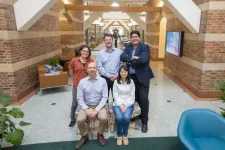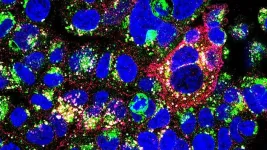(Press-News.org) “For robots to achieve true autonomy in the future, they must be able to assess risks before making decisions,” says Nader Motee (pictured below), a professor of mechanical engineering and mechanics in Lehigh University's P.C. Rossin College of Engineering and Applied Science.
Motee recently received a nearly $680,000 grant from the Office of Naval Research to develop a novel, multi-stage, perception-based control paradigm that will essentially help robots assess risk, and ultimately make autonomous systems safer and more efficient.
We humans conduct risk analysis all the time—from how we drive to what we say and how we say it. That analysis allows us to make a decision—slow down, say “I’m sorry,” maybe not use all caps in that text message. At this moment, robots can’t do this kind of analysis, which means they can’t make decisions on their own (a relief to most of us, no doubt). But a world with autonomous robots could be a world in which we humans get a lot of meaningful assistance from machines—more help with disaster recovery, for instance.
However, to do risk analysis, robots first require quantifying the ambiguity of perception. “In humans, our perception is based on what we’ve learned in the past,” says Motee. “But the number of samples that a robot, or a human, can be fed of any given object is limited. So there’s always ambiguity and uncertainty about what the robot is seeing. Is it a stop sign? On top of that, if there’s noise in the environment, like rain or fog or darkness, there’s uncertainty about the object itself. Is it even a sign at all? So there is uncertainty about not only the object, but also the identity of that object inside that class. So the ambiguity is the uncertainty of the uncertainty.”
Ambiguous perception in a robot is dangerous—consider, for example, the consequences of a self-driving car perceiving a stop sign as a speed limit sign.
It’s a real problem to solve, and Motee and his team are tackling it by quantifying the sources of uncertainty. Essentially, they want to go inside the black box of a range of perception modules—machine learning models that use visual sensing—to better understand how the models are perceiving the environment.
“The relationship between the input, which are the images, and the output, which are the labels (like traffic sign) is very complex,” he says. “But to quantify the ambiguity and the output of perception, I have to analyze these models and the relationships between these two quantities. Then I can compute if I have some uncertainty on the output, how that would be transferred to the output.”
That’s the first step.
“Once we quantify the ambiguity,” he says, “we could use risk measures for decision-making purposes.”
A robot capable of assessing risk could, in theory, make a safe decision on its next course of action. A team of robots could communicate effectively. They could also perceive the actions of the humans around them and infer how they could best assist them.
“But they have to assess risk first to determine if their next course of action is actually going to help the humans, or make their work even harder. They’ll have to do a lot of analysis.”
And so will Motee and his team. But he finds the prospect of a future where perception modules work as a connected network exciting. They could perceive information about our health, our transportation system, and our security.
“These modules would collaborate with each other,” he says, “and hopefully create a smart society that could improve our health and our lifestyles.”
Research reported in this story is supported by the United States Navy/Office of Naval Research under award number N000142312779.
About Nader Motee
Nader Motee is a professor in the Department of Mechanical Engineering and Mechanics at Lehigh University. He directs the Autonomous and Intelligent Robotics (AIR) Lab and the Distributed Control and Dynamical Systems (DCDS) Laboratory in the P.C. Rossin College of Engineering and Applied Science. He received a PhD in electrical and systems engineering from the University of Pennsylvania in 2007 and was a postdoctoral scholar at the Control and Dynamical Systems Department at Caltech and a visiting scholar at UCSB. Motee's research interests include distributed control systems and real-time robot perception. He is a Senior Member of IEEE. His recent recognitions include the 2019 Best SICON Paper Prize, ONR Young Investigator Award (2016), NSF Faculty Early Career Development (CAREER) Award (2015), and AFOSR Young Investigator Award (2013).
END
Helping robots assess risk
New ONR-funded project led by Lehigh University mechanical engineering professor Nader Motee tackles the problem of ambiguity in robot perception
2023-10-30
ELSE PRESS RELEASES FROM THIS DATE:
Want to achieve your goals? Get angry
2023-10-30
WASHINGTON -- While often perceived as a negative emotion, anger can also be a powerful motivator for people to achieve challenging goals in their lives, according to research published by the American Psychological Association.
“People often believe that a state of happiness is ideal, and the majority of people consider the pursuit of happiness a major life goal,” said lead author Heather Lench, PhD, a professor in the department of psychological and brain sciences at Texas A&M University. “The view that positive emotion is ideal ...
NYU Langone receives $9.8 million to advance pediatric medicine
2023-10-30
The Department of Pediatrics at NYU Langone Health has received $9.8 million from NYU Langone trustee Trudy Elbaum Gottesman and Robert W. Gottesman, founding donors of Sala Institute for Child and Family Centered Care, which has profoundly influenced excellence in clinical care across Hassenfeld Children’s Hospital at NYU Langone since 2013.
“We are proud to support innovations in pediatric research and career growth of physician–scientists,” said Trudy Elbaum Gottesman. “Our commitment is unwavering and focused on enhancing outcomes ...
Society for Neuroscience 2023 Promotion of Women in Neuroscience Awards
2023-10-30
WASHINGTON – The Society for Neuroscience (SfN) will honor six researchers who have made significant contributions to the advancement of women in neuroscience. The awards will be presented during Neuroscience 2023, SfN's annual meeting.
“SfN proudly recognizes these neuroscientists for their outstanding scientific achievements and efforts to support other researchers,” said SfN President Oswald Steward. “Their dedication to scientific excellence and inclusion of women along the length of the research pipeline results in a stronger, more relevant field of neuroscience.”
Bernice Grafstein Award for Outstanding ...
Society for Neuroscience 2023 Outstanding Career and Research Achievements
2023-10-30
WASHINGTON – The Society of Neuroscience (SfN) will honor leading researchers whose
pioneering work has transformed neuroscience — including the understanding of the visual
system, addiction, synaptic plasticity, and learning and memory — with this year’s Outstanding
Career and Research Achievement Awards. The awards will be presented during Neuroscience
2023, SfN’s annual meeting.
“The Society is honored to recognize this year’s awardees, whose groundbreaking work has
transformed our understanding of plasticity in ...
Society for Neuroscience 2023 Early Career Scientists’ Achievements and Research Awards
2023-10-30
WASHINGTON – The Society for Neuroscience (SfN) will honor eight early-career researchers whose work is transforming our understanding of the neural dynamics of touch sensation, spatial navigation, memory circuits, and more. The awards will be presented during Neuroscience 2023, SfN's annual meeting. “This year’s Early Career Awardees are pushing the boundaries of neuroscience by combining cutting-edge methods in machine learning, microscopy, genetics, biophysics, and beyond,” said SfN President Oswald ...
Society for Neuroscience 2023 Education and Outreach Awards
2023-10-30
WASHINGTON – The Society for Neuroscience (SfN) will present five neuroscientists with this year’s Science Education and Outreach Awards, comprising the Award for Education in Neuroscience, the Science Educator Award, and the Next Generation Awards. The awards will be presented during SfN’s annual meeting, Neuroscience 2023.
“The Society is honored to recognize this creative group of neuroscientists working to educate the public about science and combat misinformation,” SfN President Oswald Steward, said. “Their innovative approaches — including games and viral social media videos — inspire not just the next generation of neuroscientists, ...
A sustainable alternative to air conditioning
2023-10-30
As the planet gets hotter, the need for cool living environments is becoming more urgent. But air conditioning is a major contributor to global warming since units use potent greenhouse gases and lots of energy.
Now, researchers from McGill University, UCLA and Princeton have found in a new study an inexpensive, sustainable alternative to mechanical cooling with refrigerants in hot and arid climates, and a way to mitigate dangerous heat waves during electricity blackouts.
The researchers set out to answer how to achieve a new benchmark in passive cooling inside naturally conditioned buildings in hot climates such as Southern California. They examined the use of roof materials ...
Microdroplets, macro results: Beckman researchers pursue Energy Earthshots
2023-10-30
Good things come in microscopic packages, according to the Beckman Institute for Advanced Science and Technology’s new DROPLETS project.
By packaging electrochemical reactions in smaller-than-standard serving sizes, interdisciplinary researchers aim to produce clean hydrogen, sequester carbon dioxide, and store renewable energies like wind and solar inexpensively and sustainably. Their project, called DROPLETS, received $4.5 million from the U.S. Department of Energy’s Office of Science through its Energy Earthshots Initiative.
“If we do this right, we will ...
Landmark menopause toolkit updated to improve assessment and treatment
2023-10-30
Care for women with menopausal health issues should improve globally following the release of an updated Monash University-led toolkit that guides health professionals around the world in assessing and treating them.
Endorsed by the International, Australasian and British Menopause Societies, the Endocrine Society of Australia and Jean Hailes for Women’s Health, the 2023 Practitioner’s Toolkit for Managing the Menopause is designed to be used anywhere in the world.
Published in Climacteric, the Toolkit has been updated and enhanced from the original 2014 Toolkit for practitioners with new advice and therapies based on a systematic review of the latest menopause ...
New antibody could target breast cancers
2023-10-30
An enzyme that may help some breast cancers spread can be stopped with an antibody created in the lab of Cold Spring Harbor Laboratory Professor Nicholas Tonks. With further development, the antibody might offer an effective drug treatment for those same breast cancers.
The new antibody targets an enzyme called PTPRD that is overabundant in some breast cancers. PTPRD belongs to a family of molecules known as protein tyrosine phosphatases (PTPs), which help regulate many cellular processes. They do this by working in concert with enzymes called kinases to control how other proteins ...
LAST 30 PRESS RELEASES:
Emerging class of antibiotics to tackle global tuberculosis crisis
Researchers create distortion-resistant energy materials to improve lithium-ion batteries
Scientists create the most detailed molecular map to date of the developing Down syndrome brain
Nutrient uptake gets to the root of roots
Aspirin not a quick fix for preventing bowel cancer
HPV vaccination provides “sustained protection” against cervical cancer
Many post-authorization studies fail to comply with public disclosure rules
GLP-1 drugs combined with healthy lifestyle habits linked with reduced cardiovascular risk among diabetes patients
Solved: New analysis of Apollo Moon samples finally settles debate about lunar magnetic field
University of Birmingham to host national computing center
Play nicely: Children who are not friends connect better through play when given a goal
Surviving the extreme temperatures of the climate crisis calls for a revolution in home and building design
The wild can be ‘death trap’ for rescued animals
New research: Nighttime road traffic noise stresses the heart and blood vessels
Meningococcal B vaccination does not reduce gonorrhoea, trial results show
AAO-HNSF awarded grant to advance age-friendly care in otolaryngology through national initiative
Eight years running: Newsweek names Mayo Clinic ‘World’s Best Hospital’
Coffee waste turned into clean air solution: researchers develop sustainable catalyst to remove toxic hydrogen sulfide
Scientists uncover how engineered biochar and microbes work together to boost plant-based cleanup of cadmium-polluted soils
Engineered biochar could unlock more effective and scalable solutions for soil and water pollution
Differing immune responses in infants may explain increased severity of RSV over SARS-CoV-2
The invisible hand of climate change: How extreme heat dictates who is born
Surprising culprit leads to chronic rejection of transplanted lungs, hearts
Study explains how ketogenic diets prevent seizures
New approach to qualifying nuclear reactor components rolling out this year
U.S. medical care is improving, but cost and health differ depending on disease
AI challenges lithography and provides solutions
Can AI make society less selfish?
UC Irvine researchers expose critical security vulnerability in autonomous drones
Changes in smoking status and their associations with risk of Parkinson’s, death
[Press-News.org] Helping robots assess riskNew ONR-funded project led by Lehigh University mechanical engineering professor Nader Motee tackles the problem of ambiguity in robot perception



